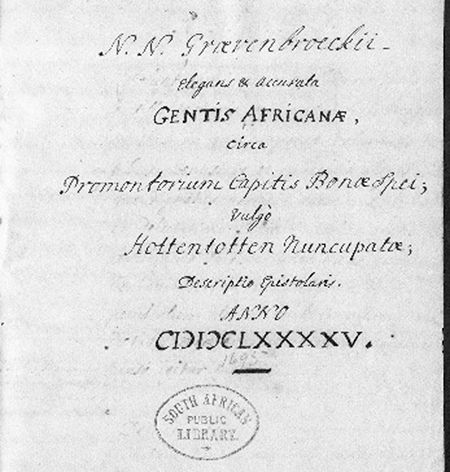The ongoing influence of colonialism can be seen across the world, as it has had a lasting impact on societies and cultures. In South Africa, the repercussions of colonialism have been particularly profound, marked by periods of Dutch and British rule.
A research project titled "Colonial Pasts and Transnational Futures", led by Dutch professor and researcher Prof Tycho Maas, meticulously examines colonial texts from the Cape to shed light on the complex legacy of colonialism. He delves into these 17th- and 18th-century texts as a shared heritage between South Africa and the Netherlands in order to establish their potential to provide insight into challenges of today's globalising world.
Prof Maas pursued his PhD in literature at Stellenbosch University and the University of Amsterdam and completed a postdoctoral fellowship at the North-West University (NWU). At present he serves as an assistant professor of Early Modern Textual Culture at Utrecht University in the Netherlands, while simultaneously holding the position of an extraordinary researcher at the NWU’s School of Ancient Texts.
Texts challenge prevalent narratives
“My goal with the project is to emphasise the relevance of these texts for South African and Dutch audiences, highlighting their value as transnational resources. Many of these texts have been disregarded historically due to their colonial origins and the language in which they are written.
“Also, literary history found them aesthetically less pleasing than, say, similar genres from mainland Europe. Yet, these Cape texts offer significant nuances that actually challenge prevalent narratives of and also about the era,” he says.
By focusing on texts that have been overlooked, Prof Maas encourages readers to look at this shared heritage from a fresh perspective.
"Many of these texts were written in early modern Dutch, but they were not transported to Europe and instead ended up in libraries and archives in South Africa. To assess the value of these texts, one needs an understanding of the early modern Dutch language and culture, as well as a familiarity with the Cape geography and culture of the time,” he says.
For example, various settlers criticised colonial policies endorsed by the Dutch East India Company. Their first-hand experiences provide a multifaceted view of the colonial era, emphasising the variety of opinions and viewpoints that existed during that time. “This is an addition to the body of writing about the Cape as it existed in Europe and is also valuable when coming to terms with colonial history in a South African context.”
Lessons from the past for today
Furthermore, the texts that stand at the centre of Prof Maas’s research provide a valuable perspective for examining contemporary global challenges, such as conflict and migration.
In November 2023, Prof Maas co-edited a special issue on Afrikaans by the Dutch journal for world literature, Armada. It was presented to South African ambassador HE Vusi Madonsela, who in his speech at the presentation emphasised the importance of cooperation between his country and the Netherlands in tackling the challenges of our globalised world.
Given the uniquely complex shared history of the two countries, they can find examples in the past for transnational issues of the 21st century and can be a source of inspiration globally. Prof Maas encourages readers to explore connections between different cultures and peoples, including in the realm of minorities and race, by studying colonial texts as a shared heritage.
In the 2024 academic year, students from the NWU and Utrecht University will be collaborating on a virtual exchange project. The project will involve the study of 17th- and 18th-century texts, with Dutch and South African students helping each other in understanding them.
The students will share their thoughts with each other and explore the content of these texts in relation to broader themes of colonialism, shared heritage and transnational perspectives. This project has received funding from the Dutch Ministry of Education, Culture and Research.

Prof Tycho Maas.

The South African ambassador HE Vusi Madonsela, receives the special issue on Afrikaans by the Dutch journal for world literature, Armada, from Prof Tycho Maas.


Colonial texts from the Cape.
